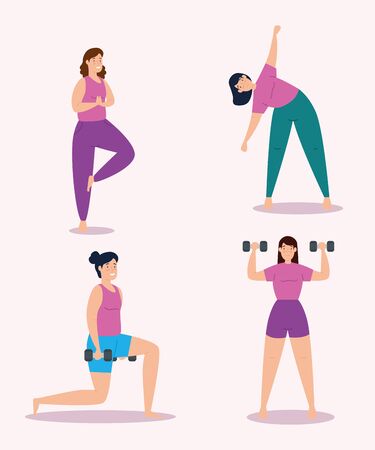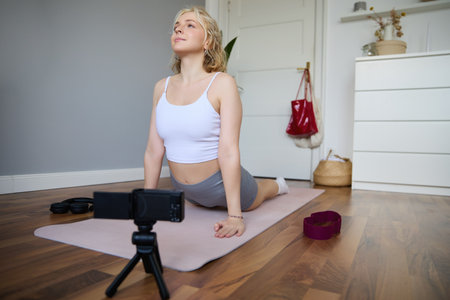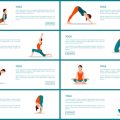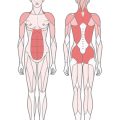Introduction: The Modern British Workplace and Its Aches
The modern British workplace is a far cry from the bustling factory floors of yesteryear, yet its sleek office spaces and high-tech conveniences bring their own set of challenges. Across the UK, thousands of office workers spend long hours hunched over desks, tapping away at keyboards or attending back-to-back virtual meetings. While technology has transformed how we work, it has also introduced a new wave of postural and musculoskeletal issues that are quietly affecting our wellbeing. From stiff necks after marathon Teams calls to lower back pain caused by less-than-ergonomic home office setups, these aches have become common complaints in daily British working life. Understanding how these habits impact our bodies is the first step towards finding practical solutions that can help restore comfort, balance, and productivity to our busy routines.
Pilates: A Time-Tested Solution for Postural Problems
Within the hustle and bustle of British office life, many workers find themselves hunched over desks, glued to screens, and plagued by aches that stem from poor posture. Pilates, a method developed in the early 20th century by Joseph Pilates, has stood the test of time as an effective approach to addressing these very concerns. At its core, Pilates is designed to strengthen the body’s deep postural muscles, improve alignment, and restore natural movement patterns – all essential for those enduring long hours at a desk.
Core Principles of Pilates
Pilates is underpinned by several foundational principles which make it especially suitable for combating work-related ailments:
| Principle | Description |
|---|---|
| Concentration | Focusing the mind on each movement to ensure correct technique and engagement. |
| Control | Moving with precision to avoid strain and reinforce muscle balance. |
| Centre | Engaging the powerhouse muscles around the abdomen and lower back for stability. |
| Flow | Coordinating movements smoothly, reflecting everyday functional tasks. |
| Precision | Maintaining accuracy in posture and alignment throughout exercises. |
| Breath | Utilising breathing techniques to enhance movement quality and relaxation. |
Pilates for the British Workplace
The sedentary nature of typical British office jobs often leads to rounded shoulders, tight hips, and lower back pain – issues that Pilates directly addresses. By strengthening the core and promoting spinal mobility, regular practice can counteract hours spent seated or standing in static positions. Furthermore, incorporating mindful breathing helps reduce workplace stress, fostering both physical ease and mental clarity.
Pilates Relevance in Tackling Office Issues
| Common Ailment | Pilates Approach |
|---|---|
| Neck & Shoulder Tension | Exercises to open the chest and strengthen upper back muscles. |
| Lower Back Pain | Core stability routines that support proper spinal alignment. |
| Tight Hips & Hamstrings | Stretching sequences that increase flexibility and mobility. |
A Practical Step Forward
For those navigating British office environments – from city centre high-rises to countryside co-working spaces – integrating Pilates into your daily or weekly routine can be transformative. It’s not just about exercise; it’s about restoring balance in body and mind amidst modern working life.

3. Typical Workplace Ailments in the UK
Across the UK, office culture has shifted dramatically over the past decade, with an increasing number of professionals spending most of their working hours seated at desks, often in front of computer screens. This sedentary routine, while seemingly harmless, is a key contributor to a variety of physical complaints that are all too familiar to British workers.
Neck Stiffness and Shoulder Tension
One of the most common grievances voiced by those working in offices from London to Leeds is persistent neck stiffness and shoulder tension. Long periods spent hunched over laptops or desktop monitors—often without regular breaks—can lead to muscular imbalances and discomfort. The British tendency to power through lunch at one’s desk, or to join virtual meetings back-to-back, only compounds these issues.
Lower Back Pain
Lower back pain is another frequent complaint within UK workplaces, particularly among those who lack ergonomic chairs or adjustable workstations. Many Brits find themselves slouching or perching on unsupportive seating for hours on end, contributing to poor spinal alignment and chronic discomfort. The daily commute—be it by car, train, or Tube—further exacerbates the problem, as prolonged sitting puts extra strain on the lumbar region.
Mental Fatigue and Stress-Related Tension
Beyond physical aches and pains, British employees also report significant mental fatigue and stress-related muscle tension linked to high workloads and tight deadlines. In bustling cities like Manchester or Edinburgh, where the pace can be relentless, this can manifest as generalised tension throughout the body—particularly in the upper back and jaw.
The Role of Workplace Habits
British workplace customs—such as minimal movement between meetings, infrequent screen breaks, and reliance on quick cups of tea for comfort—contribute to these postural problems. Recognising these patterns is the first step towards addressing them holistically. Pilates offers practical solutions for mitigating these typical ailments by encouraging mindful movement and strengthening postural muscles; however, understanding the unique challenges faced by UK workers is crucial in tailoring effective interventions.
4. Benefits of Pilates for Workplace Wellbeing
For many British professionals, the daily grind often means hours spent at a desk, hunched over a laptop or shuffling between meetings. This sedentary lifestyle can take its toll on both body and mind. Incorporating regular Pilates practice into your routine offers tangible benefits that specifically address the physical strains of the modern British workplace.
Posture: The Foundation of Office Health
Pilates is renowned for its focus on core strength and alignment, which are crucial for maintaining good posture. By engaging deep stabilising muscles, Pilates helps counteract the effects of slumping and rounded shoulders—common issues among office workers from London to Manchester. Improved posture not only alleviates back and neck pain but also enhances your overall appearance and energy levels.
Flexibility: Easing Tension from Head to Toe
Long periods of sitting can lead to tight hips, hamstrings, and shoulders. Pilates incorporates dynamic stretches and controlled movements that gently lengthen muscles, increasing flexibility. This improved range of motion makes everyday activities—like cycling to work or carrying shopping bags—more comfortable and less likely to result in injury.
Overall Wellness: Supporting Mind and Body Balance
Beyond physical benefits, Pilates encourages mindful breathing and mental focus, helping busy professionals better manage workplace stress. Many find that just a few sessions per week lead to improved concentration, reduced fatigue, and a greater sense of wellbeing throughout their working day.
Pilates vs Traditional Exercise: A Quick Comparison
| Aspect | Pilates | Traditional Exercise |
|---|---|---|
| Posture Support | Emphasises spinal alignment and core stability | Often neglected unless specifically targeted |
| Flexibility | Integrated stretching with every movement | Usually requires separate stretching routines |
| Mental Wellbeing | Focuses on breathwork and mindfulness | Mainly physical focus, less on relaxation techniques |
| Sustainability for Busy Schedules | Easily adapted for short sessions at home or office | May require more time or equipment commitment |
A Practical Approach for British Professionals
Whether you’re based in a bustling London office or working remotely from the countryside, Pilates offers a flexible solution that fits around your schedule. Even ten minutes before your morning cuppa or during a lunch break can make a noticeable difference. With its holistic approach, Pilates is fast becoming an essential part of workplace wellbeing across the UK.
5. Incorporating Pilates into the British Workday
Bringing Pilates into your everyday working life in the UK doesn’t have to be a daunting task. With a little creativity and some local know-how, you can weave movement and mindful posture into even the busiest office schedule. Below, discover practical tips and resources for seamlessly integrating Pilates into your routine—whether you work in a bustling London office or from the comfort of your home in the Cotswolds.
Make Use of Local Pilates Classes
Many British cities and towns now offer a variety of Pilates options, including studio-based mat sessions and reformer classes tailored to all levels. Consider coordinating with colleagues to attend a lunchtime class at a nearby studio or even inviting a certified instructor into your workplace for group sessions. Local councils sometimes sponsor wellbeing initiatives or subsidised fitness classes, so check noticeboards or HR updates for opportunities close to your office.
Embrace Lunchtime Movement Breaks
Lunchtime Pilates sessions are gaining popularity in many UK workplaces. These short, 30- to 45-minute classes can be scheduled in meeting rooms or quiet spaces. If there’s no formal offering, try forming an informal group to follow online routines together. All you need is a yoga mat and perhaps a few resistance bands—no special kit required. Even ten minutes of guided stretching or core activation can make a noticeable difference to afternoon energy levels and posture.
Home-Based Routines for Hybrid and Remote Workers
For those working from home, online Pilates resources abound, many led by instructors familiar with British working habits and common postural issues. Look for live-streamed classes on platforms such as MoveGB, Gympass, or local studios’ own websites. To build consistency, schedule your session as you would any work meeting—perhaps first thing in the morning or as a mid-afternoon pick-me-up.
Practical Tips for Daily Integration
- Set reminders to stand up and perform simple stretches every hour—try ‘spinal articulation’ or ‘shoulder bridge’ exercises at your desk.
- Swap out your standard chair for an exercise ball during video calls to encourage active sitting and core engagement.
- Create a mini-studio by keeping a mat rolled up under your desk and using it for quick mobility flows between tasks.
Connecting with the Community
The UK has a vibrant Pilates community—consider joining local Facebook groups or Meetup events to find accountability partners and share tips. Many instructors also offer discounted corporate packages or taster sessions for businesses keen on improving staff wellbeing.
By taking advantage of these resources and making small but consistent changes, anyone can experience the benefits of Pilates—improved posture, reduced aches, and better balance—right within the rhythm of their British workday.
6. Fostering a Culture of Movement and Balance
Creating a workplace that truly values postural health goes beyond ergonomic chairs and standing desks—it’s about nurturing a culture of movement and balance at every level. In the UK, where long hours at the desk are commonplace, both employers and employees have a shared responsibility to champion proactive approaches for wellbeing. Employers can take the lead by integrating Pilates-based movement breaks into the working day, offering onsite or virtual classes, and ensuring communal areas are designed for flexibility and comfort. At the same time, employees can set an example by advocating for active lunch breaks, forming wellness groups, or even initiating gentle stretching sessions in meeting rooms. Encouraging open conversations around back pain, fatigue, and stress helps to break down the stigma often associated with workplace ailments, empowering everyone to seek support without hesitation. By working together—sharing resources, celebrating movement milestones, and prioritising regular posture check-ins—British workplaces can shift from reactive solutions to preventative care. This collective mindset doesn’t just benefit individual health; it boosts morale, enhances productivity, and fosters a sense of community rooted in mutual wellbeing. Ultimately, when movement and balance become woven into daily routines, healthier habits flourish naturally—ensuring Britain’s workforce remains resilient, energised and ready to meet the demands of modern professional life.


